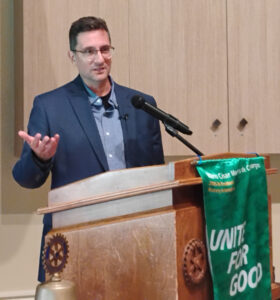Boardman administrator speaks to Rotarians

YOUNGSTOWN — Rotarians are known for their commitment to community service and networking to solve problems in their local communities.
Their speaker on Wednesday said sometimes the solution to mounting problems is as simple as taking a swing and seeing what happens. Sometimes, it works out better than expected.
Boardman Township Administrator Jason Loree was the guest at the Rotary Club of Youngstown’s weekly luncheon at the Wick Park Pavilion on Youngstown’s North Side.
Loree said his 7-year-old daughter is his motivation to make the place he calls home even better.
“When I go to work and I think about what I’m going to do today, I think about what I’m going to do to help make her future better,” he said. “Sometimes it’s small things and sometimes it’s big things.”
Loree talked about how the township, working with the ABC Stormwater District, turned the former Market Street School into a “first-of-its-kind” stormwater park to help alleviate flooding issues that have plagued the township and also make good use of a space that may have gone to waste.
Through creative fundraising efforts and seeking state and federal grants, Boardman raised more than $4 million to build the park without using township or ABC funds. The grand opening of the park will be Oct. 29.
“Now it’s going to be this beautiful green space, wetland rehabilitated area that has a trail around it that’s going to be there indefinitely,” he said. “We took what would have been a brownfield and turned it into a green field.”
That, of course, is not all the township is doing to alleviate flooding problems. In 2023, Boardman became the first township in Ohio to receive a FEMA Flood Mitigation Assistance grant, worth $47 million.
Loree said township officials never expected to actually receive it, but they decided it was worth the effort to at least try.
“For a township to try to apply for that is pretty well unheard of,” he said.
The cost to assemble the engineering assessment that laid the foundation for the grant was about $260,000 “for a grant application that was just a shot in the dark,” Loree said.
Loree said they knew they had a better chance when the Ohio EPA called to say they had never seen an application like it — one that included in-depth engineering evaluation and a proof-of-concept built in. On that basis, they recommended it to FEMA for consideration.
Loree said six people worked on the application, four of which were engineering consultants, and only two were township employees — himself and former roads superintendent Marilyn Kenner.
Loree said the job of public service, as he sees it, is about knowing what your responsibilities are and asking for help when you need it.
He said when the township met with federal officials about the project, they asked how Boardman might help other communities put together similar application packages.
“I said, well, it comes down to a couple things — funding and expertise. I don’t know everything. My job is not to know everything, but to learn about it as much as I can to help my elected officials,” he said. “It’s not me. I can’t figure it out. I found a bunch of people to help figure it out.
“The stewardship of being an elected official — and I’m not one, but working with them — is about figuring out ways to help the community and the business sector,” he said. “It’s supporting businesses through infrastructure support, supporting it through police and fire support. Thinking about all the ways to help places like the Southern Park Mall.”
Loree said his township is aware of some of the problems with local businesses, like the one that recently bought the mall.
“We can’t pick and choose who buys what. The government has no role in the exchange of private property, So when they say ‘you should stop people like Kohen from buying the mall because they don’t pay their property taxes’…if you can find a way to do that, please let me know,” he said. “Because the Ohio Revised Code is pretty clear about that.”
For right now, the unpaid property taxes on the mall represent a potential $200,000 to $300,000 budget cut for next year for Boardman, all of which reduces funding available for police, fire, EMS, roads, and the other services the township provides. Those unpaid taxes also reduce available money for the school district.
PROPERTY TAXES
Speaking before the luncheon, Loree said he is concerned about the prospect of voters eliminating property taxes, which would cost the township the great majority of its funding base.
A move to eliminate property taxes in Ohio appears increasingly likely to make the ballot for May, and if it passes, every levy that voters have approved in the state would become unconstitutional and all of that revenue would be lost.
“There is a drive right now by a citizens group to abolish all property taxes, and if it is successful, the township will have to revert back to basically just paving roads,” Loree said. “In Ohio, the only tuning a township really is required to do is road maintenance and cemetery maintenance. Outside of that, everything else is voted on millage for police, fire and EMS services.”
He said all of those other services would have to fall to the county to cover, like the Mahoning County Sheriff’s Office providing police coverage, which also demands either a paid contract with the township or MCSO picking up the cost, something Loree does not expect would be feasible if the sheriff has to cover all of the county.
Another possibility is that Boardman could seek to become a village or city, but Ohio law, as it is now, makes that process very difficult. That would allow the community to be funded through income taxes.
“In order to become a city or a village quick enough if property taxes go away, there wouldn’t be enough time to do that under the current ORC setting, so we’d be looking for some relief through the Ohio legislature to change the requirement for places like Boardman, for cities to form a little bit easier,” Loree said.
He said the township would only have about a year to complete that process if it hopes to avoid losing almost all funding with the elimination of property taxes.


